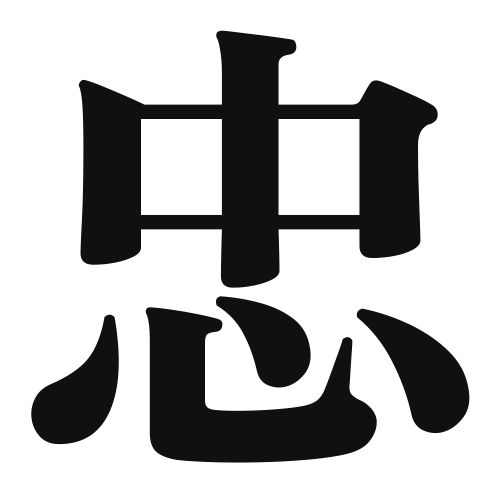1. Overview of Meaning
The kanji “忠” (chū) means “loyalty” or “faithfulness.” It represents a deep sense of devotion and allegiance, often associated with loyalty to one’s country, family, or friends.
2. Formation and Radical
The kanji “忠” is composed of two parts: the radical “心” (kokoro), which means “heart,” and the character “中” (naka), meaning “middle” or “inside.” This combination suggests that true loyalty comes from the heart, emphasizing sincerity and inner commitment.
The kanji is classified as a compound character (会意文字), as it combines elements to convey a specific meaning.
3. Examples of Usage
Common words and phrases that include “忠” are:
- 忠誠 (chūsei) – loyalty
- 忠告 (chūkoku) – advice or counsel
Example sentence in daily conversation:
「彼は会社に対して非常に忠実です。」(Kare wa kaisha ni taishite hijō ni chūjitsu desu.) – “He is very loyal to the company.”
4. Synonyms and Antonyms
Similar kanji with related meanings include:
- 誠 (makoto) – sincerity, which emphasizes honesty and truthfulness.
- 信 (shin) – trust, which focuses on reliability and faith in others.
Antonyms include:
- 裏切り (uragiri) – betrayal, which signifies a lack of loyalty or faithfulness.
5. Cultural and Historical Background
The concept of “忠” is deeply rooted in Japanese culture, particularly in the context of the samurai code, known as “bushido,” which emphasizes loyalty to one’s lord and family.
Proverbs and idiomatic expressions related to “忠” include:
- 忠犬 (chūken) – “loyal dog,” often used to describe someone who is unwaveringly loyal.
This kanji reflects the values of loyalty and dedication that are highly regarded in Japanese society.
